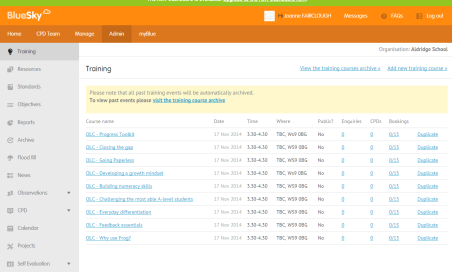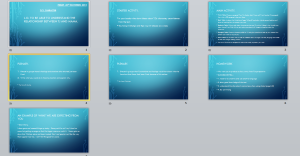
Introduction:
CPD is most effective in improving teachers’ practice and pupils’ achievement when it is sustained and evaluated (Joe Kirby @joe__kirby )
In my first year as Assistant Headteacher I implemented many different ways for staff to share practice with each other – Open Classrooms, Tea-time tasters, termly T&L journal in addition to the existing programme of CPD. There has been a good voluntary uptake and comments have been positive but I was still left with a nagging doubt – ‘How do I know if this is making a difference to the quality of learning for our students?.’
Outstanding Learning Communities:
Barely 1% of training [CUREE] looked at was effectively transforming classroom practice.”
Teacher Development Trust
After reading a range of blog post and articles about effective CPD I realised a need to develop our bespoke programme in a more sustained and focussed way. This blog is intended to outline how I set up teacher groups called Outstanding Learning Communities and my long-term plans for this part of the CPD programme. Considering the effectiveness of our existing CPD, I used the performance system Bluesky to set up 10 Outstanding Learning Communities (OLCs). I split the groups into ten areas of what I think makes great teaching and each OLC group would focus on one of these ten areas during 4 Twilight sessions. By signing up through Bluesky, staff are able to focus on a particular area of pedagogy and lesson observation targets can be linked to these areas. Each group is led by either a T&L coach or key staff e.g. Faculty Leader for SEN, AHT for Pupil Premium etc. You can see the 10 OLCs below:

However, as Joe Kirby points out the main reason much CPD is ineffective is a complete lack of evaluation. Once training is delivered, only 3% of secondary schools evaluate the effectiveness of its impact on student attainment. A key element of the OLCs is for staff to measure the impact of their actions and be able to make recommendations to the whole-school community.
The OLC’s met for the 1st time on 17th November. Each group were given an introduction on the focus of their OLC – Growth Mindset, Effective Feedback, Closing the gap etc. Following each session each OLC developed a page using our learning platform (@FrogEducation) that would enable articles, research and ideas to be shared between sessions.


Next Term:
In further sessions over the coming term staff will discuss how the impact of their CPD can be evaluated. The Teacher Development Trust wrote this excellent article on ‘Has your CPD had an impact?’ which outlines some simple tools to to consider the impact of professional learning such as student surveys, case study students, using peer observation and video software. The article does not advocate a single approach but recommends that methods are adapted and used in combination where appropriate. The key findings of this article will be shared with staff and there will be time for further collaboration. Each member of staff will then complete the exit ticket below detailing the strategies for development and how they intend to monitor the impact on student learning.

Research from the Teacher Development Trust (2012) shows that effective CPD follows cycles of trying, reflecting and adjusting. In the time between Session 2 and 3 staff will have time to follow this cycle and embed strategies into their daily classroom practice. The third session will be an opportunity for each group to reflect on their learning and how their findings should inform future. Each group will prepare a short 2-3 min presentation based on their recommendations and a display board to be used for the final whole-school ‘Teach-meet’ session.
Ultimately the OLCs are still in the early stages and I will blog again about our findings. I am confident though, that this is the right step in moving our CPD programme to be evidence-based, collaborative, sustained and evaluated.
Useful Links:
http://www.sec-ed.co.uk/best-practice/views-on-how-to-ensure-your-schools-cpd-programme-is-effective
http://improvingteaching.co.uk/2014/02/23/being-the-1-what-does-it-take-to-make-cpd-effective/










 d a task to develop their understanding and help them achieve a higher grade in their assessment. When we came up with the diary entry idea we realised this was good task for the class to learn more about TJ’s mannerisms. Whilst setting the task, we asked the class whether they understood the success criteria and we went through this with them, so when at home they could complete it to a high standard and had no excuses.
d a task to develop their understanding and help them achieve a higher grade in their assessment. When we came up with the diary entry idea we realised this was good task for the class to learn more about TJ’s mannerisms. Whilst setting the task, we asked the class whether they understood the success criteria and we went through this with them, so when at home they could complete it to a high standard and had no excuses.